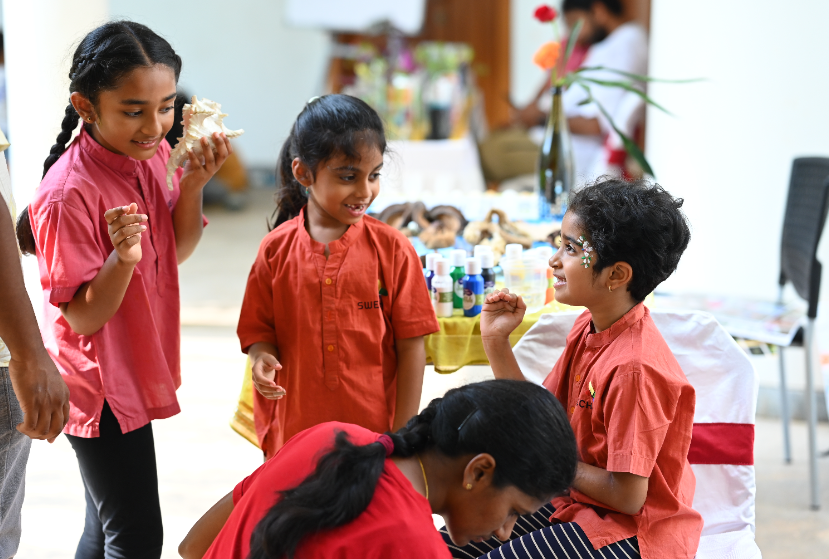Does Waldorf Education “Slow Down” Children or Make Them “Non-Competitive”?
In a culture that celebrates achievement by speed, quantifiable grades, and relentless comparison, the gentle rhythm of Waldorf education can feel unfamiliar—even unsettling. Especially for parents in India exploring alternatives to mainstream academics, questions surface: Does the Waldorf approach slow down my child? Will they fall behind? Are they prepared for a competitive world?
These questions matter deeply. But they are best answered not by defending pace or performance, but by redefining purpose.
At Swechha Waldorf Inspired School, the first Waldorf school in Vizag, we invite parents to ask a different kind of question: What kind of adulthood are we preparing our children for? Not simply in terms of academics or careers, but in terms of clarity, confidence, creativity, and compassion. In the Waldorf world, education is not an escalator but a landscape—rich with experiences, feelings, and wonder.
Reclaiming Childhood from the Clock
To understand if Waldorf education "slows down" children, we must first reflect on what we’re comparing it against. Conventional education often prides itself on early reading, rote memorization, and testing—benchmarks that may look impressive on paper, but do not necessarily support long-term emotional or creative growth. Waldorf chooses to tread another path.
At Swechha, childhood is not treated as a race to readiness. Rather, it is honored as a sacred, irreplaceable season of life. The early years are full of stories, song circles, nature walks, and free play—what we call holistic learning approaches in Kindergarten. These methods are not academic delays. They are soul-deep investments in emotional intelligence, motor skills, rhythm, and imagination—gifts that continue to blossom long after early readers have forgotten their rhymes.
Slowing down, in Waldorf terms, is not regression—it is restoration.
Competition vs. Individuality: What Are We Really Measuring?
A competitive child may win races. But a connected child leads lives. Waldorf education shifts the focus from comparison to connection. From ranking to relating. In doing so, we cultivate children who can work collaboratively, think independently, and create meaningfully.
The Waldorf approach at Swechha, Visakhapatnam, is deeply rooted in developmental science. Each child is viewed as a unique being with a natural inner timetable. Learning unfolds in a rhythm, not in a rush. Our classrooms do not reward the fastest hand in the air, but the most thoughtful voice in the room. And while our children may not be thrust into exams early, they are engaged in deep, purposeful learning that builds authentic competence.
The result? Confidence that is not built on being better than others, but on becoming one’s truest self.
The Fruits of Wholeness: Where Are Waldorf Children Today?
Research and alumni studies across continents show that Waldorf-educated children grow into adaptable, articulate, and resilient adults. They excel not despite the absence of early academic pressure, but because of it. Free from burnout, they bring creativity into corporate spaces, empathy into leadership, and reflection into innovation.
At Swechha, we witness this daily. Our children are explorers, not answer-chasers. They make meaning through stories, movement, handwork, and connection. They are not afraid to pause, to ask, to wonder. And in an era of noise and haste, that is a radical act of courage.
The benefits of Waldorf education in Swechha Waldorf school extend beyond schooling. They ripple into how children treat others, how they see the world, and how they value their own journey. Academic success eventually follows—not as a pressured goal, but as a natural consequence of deep engagement.
Rhythm Over Rush: The Waldorf Way
At the heart of Swechha’s pedagogy is rhythm—not speed. The day begins with warmth, transitions are gentle, celebrations are seasonal, and learning is layered with sensory and spiritual richness. These are not "extras" but essentials. They shape a nervous system that is secure, an attention span that is anchored, and a mind that is truly open.
Our creative learning methods in Kindergarten include storytelling that stimulates language, handcrafts that support coordination, and nature-based routines that instill wonder. These early experiences are not delays. They are foundations. They are why Waldorf children arrive at academic skills not just with readiness, but with reverence.
Redefining Readiness in a World of Restlessness
Today’s world often values children for how fast they learn, how quickly they adapt, and how early they excel. But Swechha values something else: How deeply they feel? How fully they experience? How complete do they become?
In a society facing burnout and disconnection, Waldorf education offers balance. It reconnects the head with the heart through the hands. It gives space for children to breathe, to bloom, and to belong.
At Swechha, the Waldorf schooling system in Visakhapatnam is not an alternative to education—it is a return to it. A return to rhythm, to soul, and to story. A return to the child.
In Conclusion: From Pace to Purpose
Let us move the question from "Will my child be competitive?" to "Will my child be complete?" Because at the end of the day, we are not raising test-takers. We are nurturing citizens of a complex, beautiful, and often fragile world.
If you are a parent searching for the best Waldorf education in Vizag, know that Swechha is not just a school. It is a sanctuary. A space where learning is slow only because it is deep. Where childhood is not sacrificed at the altar of speed, but celebrated as the sacred unfolding that it truly is.
Let us walk slower. Feel deeper. Learn better.
Let us raise a generation that knows not just how to win—but how to wonder.
